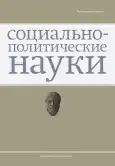卷 12, 编号 2 (2022)
Articles
Information - a New Weapon of Mass Destruction
摘要
 15-20
15-20


Mechanisms of Electronic Democracy in Modern Russia: Conditions of Formation and Development Trends
摘要
 21-26
21-26


Transformation of the political regime in Kazakhstan
摘要
 27-32
27-32


The Development of Criminal Legislation in the Era OF Peter I (Views of P.S. Romashkin)
摘要
 33-39
33-39


Countering the Violation of the Right of Protection to Participate in the Proof
摘要
 40-47
40-47


Application of Artificial Methods of Reproduction in Russia and Kazakhstan: Comparative and Legal Analysis of Legislative Regulation
摘要
 48-54
48-54


Features of Legal Regulation of the Names of Biomedical Cell Products
摘要
 55-59
55-59


ESG: Research Progress and Future Prospects
摘要
 60-66
60-66


Social Tension as One of the Key Aspects of the ESG Principles System
摘要
 67-71
67-71


The system model and the law of the crisis of trust in conditions of transforming economic relations
摘要
 72-78
72-78


Development of Relations Between the Kyrgyz Republic and the People’s Republic of China Within the Framework of the Shanghai Cooperation Organization of the context of “One Belt, One Road” Initiative
摘要
 79-87
79-87


How to Improve the Attractiveness of Chinese Universities to International Students During the “14th Five-Year Plan” Period (Take Shanghai University of Political Science and Law as an Example)
摘要
 88-95
88-95


A Diachronic Study of the Construction of Civic Ethics in China
摘要
Civic ethics, as a special ideology, is ultimately determined by the economic foundation and is always the product of concrete, realistic and specific industrial relations and social relations. Among the various social forms, the main content of civic ethics and the way of its construction vary greatly. Conduct a diachronic study of civic ethics, explore the main content of civic ethics and the ways of its construction in various social forms and make up the inevitable logic, academic orientation and basic theoretical field of research in the field of building civic ethics.
 96-105
96-105


The Influence of the United States of America on the Military-political Situation in East Asia in the Second Half of 1941: Historical and Political Analysis
摘要
 106-118
106-118


The Conflict in Syria in the Context of German Digital Publications
摘要
 119-126
119-126


China’s Soft Power: Culture and Sports
摘要
 127-133
127-133


Confucius Institute in St Petersburgas a Soft Power Tool in the Context of the “One Belt, One Road” Initiative
摘要
 134-148
134-148


Construction of the Eurasian Symbolic System in the Context of Disintegration/Integration and Disconnection/Connection with the Soviet Symbols
摘要
The author offers the symbolic approach to understanding the nature of the construction of the Eurasian identity in the framework of the EAEU as the result of (dis-)integration and (dis-)connection with the Soviet symbols. The goal of the research is to provide the interdisciplinary analysis of shaping the EAEU’s symbolic identity. The symbolic and dialectic approaches are used. The main idea consists in the suggestion that the symbols are social technology of creating EAEU’s identity. The article argues that EAEU’s symbolic system is shaping on the logic of (dis-)connection and (dis)integration with the meanings of the symbolic system of the USSR. The dialectic logic of integration and connection means greater interaction of Belarus, Kazakhstan, Kyrgyzstan, Armenia and Russia. A logic of history of integration and connection is determined on the attempt to revive the Soviet symbols which can be the basis for the construction of common symbolic system. The inner strength of such integrative process lies in the fact that the new phenomenon of the EAEU is not seeking the reincarnation of the old symbols of the Soviet era, serving the expression of utopian ideas. The key findings of the research can be the basis for the practical recommendations in terms of the Eurasian cultural policy.
 149-156
149-156


Admiration (admiratio) as a Criterion for the Autopoiesis of art (on the Example of the Distinctions of Ancient Thinkers)
摘要
 157-163
157-163


Humanitarian Knowledge at the Entrepreneurial University: Strategies of «Justification»
摘要
 164-177
164-177


Perspectives and Contradictions of Value Cohesion Within the Information Support System of the Russian Armed Forces
摘要
 178-183
178-183


Creating of Distinctions “Our-Foreign” in the Issue of “Orthodoxification” of the Western Outskirts of the Russian Empire in the XIX Century
摘要
 184-189
184-189












